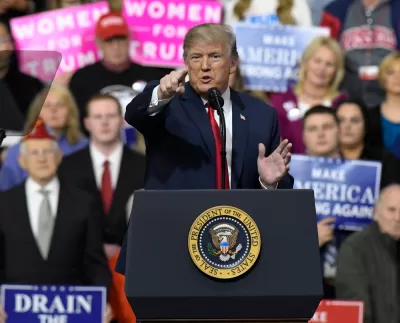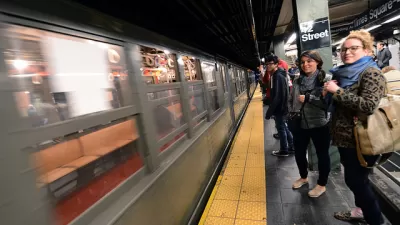It was touch and go there for a little bit today, but in the end President Trump signed a $1.3 trillion omnibus spending bill that spares many transit and community development programs.

President Trump signed a $1.3 trillion omnibus spending bill into law today, averting a government shutdown and resolving the ongoing mystery of how much funding for capital investment in transit and programs for the Department of Housing and Urban Development would survive the Republican party's control of Congress and the presidency.
Here's how Michael Grunwald describes the political drama that has flavored the Trump Administration's spending and legislative priorities in the first year-plus of its existence:
President Donald Trump’s budget proposals have taken a hatchet to President Barack Obama’s top priorities. They’ve called for deep cuts in renewable energy, medical research and nonmilitary spending in general. They’ve eliminated TIGER, a grant program for innovative transportation projects created by Obama’s stimulus bill; ARPA-E, an energy research agency launched by the stimulus; and CDBG, a community development program many Republicans consider an urban slush fund.
What then was the actual result of all those pronouncements by the Trump Administration? "Now the Republicans who control Congress have passed a $1.3 trillion omnibus spending bill, and it not only protects Obama’s priorities, it expands them," writes Grunwald.
President Trump's displeasure with the substance of the omnibus spending bill could be detected throughout the day leading up to his signing the bill. He spent the morning threatening to veto the bill and said he would "never sign another like this," but sign the bill, he did.
For more details on the substance of the omnibus spending bill, see articles posted earlier this week by Dylan Matthews for Vox and another by a trio of reporters for the Washington Post. CBS and the AP published an article about the details of the bill earlier this week. Planetizen Correspondent Irvin Dawid also reported on the consequences of the bill for the beleaguered Amtrak Gateway Program.
Here are a few key takeaways with regard to federal programs that fund planning efforts around the country:
- The budget for the TIGER transportation grant program will triple. (As noted by Angie Schmitt earlier this month, however, the TIGER grant funding under the Trump Administration might not resemble the transit-friendly program of the Obama Administration).
- The budget for the Community Developement Block Grant will almost double, from $2.8 billion to $5.2 billion.
- The Census Bureau receives $1.34 billion increase in funding over last year's allocation in the bill (the 2020 Census will still be a subject of concern).
- Trump wanted to slash the Energy Department’s renewables budget 65 percent; instead, Congress boosted it 14 percent.
- $1.6 billion for border security—but with limitations on how the money can be spent (i.e., it can't be spent on the president's pet border wall project).
FULL STORY: Congress releases $1.3 trillion spending bill — here's what's in it

Alabama: Trump Terminates Settlements for Black Communities Harmed By Raw Sewage
Trump deemed the landmark civil rights agreement “illegal DEI and environmental justice policy.”

Study: Maui’s Plan to Convert Vacation Rentals to Long-Term Housing Could Cause Nearly $1 Billion Economic Loss
The plan would reduce visitor accommodation by 25% resulting in 1,900 jobs lost.

Planetizen Federal Action Tracker
A weekly monitor of how Trump’s orders and actions are impacting planners and planning in America.

Waymo Gets Permission to Map SF’s Market Street
If allowed to operate on the traffic-restricted street, Waymo’s autonomous taxis would have a leg up over ride-hailing competitors — and counter the city’s efforts to grow bike and pedestrian on the thoroughfare.

Parklet Symposium Highlights the Success of Shared Spaces
Parklets got a boost during the Covid-19 pandemic, when the concept was translated to outdoor dining programs that offered restaurants a lifeline during the shutdown.

Federal Homelessness Agency Places Entire Staff on Leave
The U.S. Interagency Council on Homelessness is the only federal agency dedicated to preventing and ending homelessness.
Urban Design for Planners 1: Software Tools
This six-course series explores essential urban design concepts using open source software and equips planners with the tools they need to participate fully in the urban design process.
Planning for Universal Design
Learn the tools for implementing Universal Design in planning regulations.
Caltrans
Smith Gee Studio
Institute for Housing and Urban Development Studies (IHS)
City of Grandview
Harvard GSD Executive Education
Toledo-Lucas County Plan Commissions
Salt Lake City
NYU Wagner Graduate School of Public Service





























